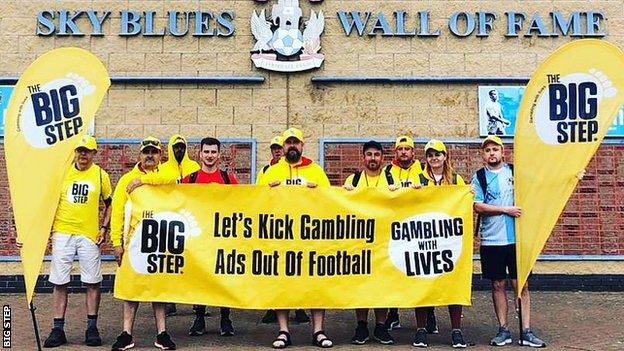Gambling and sport: 'Women don't need to feel shame about addiction any more'
- Published
'You are not on your own' - Stacey Goodwin says help available for gamblers
Dressed in a bright yellow T-shirt and cap, Stacey Goodwin has spent the past fortnight walking 300 miles from Scotland to Wembley to call for an end to gambling adverts during the European Championship.
But another aspect made her stand out - among the 30 former gambling addicts who took part in the gruelling event, she was the only woman.
The 28-year-old has been highlighting how women can feel stigmatised and ashamed because "gambling is seen as a male addiction".
Goodwin, from Chesterfield, says she "suffered alone" during a 10-year addiction which left her penniless and almost led to her taking her own life.
But after reaching out to a group of women who "made the difference" she has now been free from gambling for two years and is the "happiest I've ever been".
'The guilt and shame prevented me from telling anyone'
"I worked in a bookmakers at 18, but I never thought I would become addicted because I had never seen a woman in the betting shop," she tells BBC Sport.
"One day I had a go on a machine, and I won. That was the hook and it deteriorated so badly where I was consumed by addiction, I didn't know who I was and I couldn't hold down a relationship.
"It was relentless. No-one knew what I was going through, and at times I couldn't afford to get home from work. The guilt and shame prevented me from telling anyone. I felt so trapped and alone, it felt like there was no escape.
"If you look at adverts on TV there are very few women on them so there is a stigma around, you just don't see women gambling. It's so hard for women to come out and say 'I have a problem', because it's seen as a male addiction."

Stacey Goodwin (second right) walked the 300 miles from Scotland to Wembley last week to highlight the dangers of gambling adverts during the Euros
How 200 women reached out
Goodwin says her recovery was down to the women who "wrapped her up" while in residential treatment, and now she wants to make sure that other women don't feel alone.
She has written a book called 'The Girl Gambler' and since talking about her journey, including on TikTok, external, more than 200 female addicts have reached out to her.
"Gambling online is so anonymous, so many of the women who've been in touch have told nobody about their addiction," she says. "Having felt so alone, many of them are relieved to have found other women going through the same thing. It can be so draining.
"It's been huge pointing them to places where they can get help and I've told them I'm here to support them whenever they need me. So many women are in the same position and have no-one to speak to. That's why I started this."
It is an issue which former England international Karen Carney recognises, having seen the impact of gambling on women in her life.
She wants to raise awareness of where people can go to get help through the TalkBanStop campaign, which offers support to gambling addicts.
"It's about demystifying some of the stigmas out there and supporting those that may be struggling, especially around major sporting events where there is a big spike in betting," Carney says.
How women can help women
Goodwin says having a woman to confide in is important.
"Many treatment providers are inclusive, but talking about women's problems like postnatal depression or premenstrual stress and the effect they can have on your mental state are much easier to talk to a woman about," she adds.
"Those types of things can trigger your addiction."
Goodwin says the number of gambling adverts during matches on TV also act as a trigger for her, so she won't be able to watch the European Championship.
ITV has said it "does not seek to minimise the impact of problem gambling".
But the broadcaster says claims from Big Step that a reduced number of adverts in the Euros compared to the 2018 World Cup, and a whistle-to-whistle ban, "would be most unlikely to make a difference to problem gambling".
A spokesperson for the Betting and Gaming Council added: "The Government says the rate of problem gambling is 0.5% [of the population] and has been stable for the last 20 years. For women, the Gambling Commission says the rate is 0.1% for the last year.
"But one problem gambler is one too many, which is why we have taken a number of steps to promote safer gambling."
Goodwin says: "My message to every single person struggling, especially women is: 'you are not on your own, there are a lot of other women who go through this'.
"The worst part is almost the guilt and shame but you don't have to feel that way any more. There are places where you can get better and where people can help you."